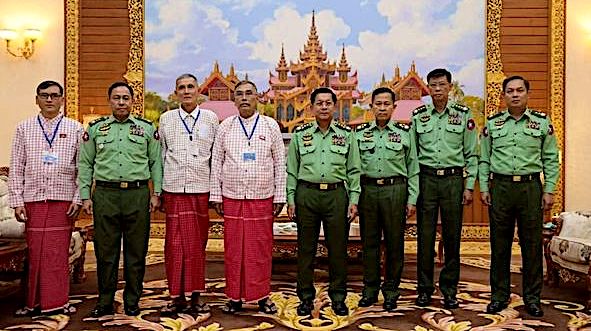The New Mon State Party (NMSP) has been heavily criticized by the Mon community after the ethnic armed organization (EAO) held talks with Myanmar’s military regime.
While the country’s major EAOs rejected the junta’s recent offer of peace talks as neither genuine nor all-inclusive, the NMSP became the second EAO, after the Restoration Council of Shan State, to meet with coup leader Senior General Min Aung Hlaing in the Myanmar capital Naypyitaw.
Established in 1958, the NMSP is one of the oldest EAOs in Myanmar. The group signed the Nationwide Ceasefire Agreement (NCA) in February 2018 and is now largely inactive.
An ethnic Mon woman from Mon State in southern Myanmar said that by choosing to hold talks with the regime, the NMSP has abandoned not only Mon people but also the whole country.
“It is obvious which direction they are taking. I think we are seriously lagging behind in this revolution. I think Mon politicians are serving their own interests with enormous ego,” said the woman.
The NMSP delegation was led by vice chair Nai Aung Min, joint general secretary Nai Win Hla and central executive committee member Nai Banyar Lel. They held talks on Monday with Min Aung Hlaing, his deputy Soe Win, General Mya Tun Oo, Lieutenant-General Moe Myint and Lieutenant-General Yar Pyae.
At the meeting, the regime agreed in principle to the establishment of a federal democratic union and the adoption of a Mon State charter, NMSP spokesperson Nai Aung Ma Ngae told The Irrawaddy.

The two sides also agreed to solve political problems through political means to achieve peace in Myanmar, added Nai Aung Ma Ngae.
“We agreed to solve the ongoing political crisis through dialogue step by step. We will first talk with the ten NCA signatories, and then with stakeholders including political parties. It will take some time,” said the NMSP spokesperson.
However, the junta-controlled newspaper Myanma Alin did not mention the adoption of a Mon State charter in its report on the talks.
Ko Agga, one of the leaders of the Mon State Revolutionary Organization, which was established last year after the military’s coup, said that the NMSP’s leaders are making themselves and the party notorious.
He said that while political dialogue is desirable, now is not the right time to hold talks with the regime.
“This revolution has emerged because the crisis can’t be solved by political means. Dialogue will work only when it is all-inclusive with EAOs and the National Unity Government. While the revolution is gaining momentum, the talks offered by the regime are unrealistic and can’t be trusted,” said Ko Agga.
NMSP spokesperson Nai Aung Ma Ngae insisted that the talks with the junta were a political necessity for the Mon people, who number around 1.1 million in Myanmar.
“Executive members of the party discussed what is pragmatic for us and the political necessities of our people. We have consulted with and sought approval from relevant political parties and monks to attend the meeting,” he said.
Despite some agreement at the meeting between the NMSP and the regime, it is unlikely that the Mon people will be granted self-determination, said a political analyst.
“A few days ago, [junta spokesman] Major-General Zaw Min Tun said that the military will uphold the 2008 Constitution. So self-determination is unlikely for the Mon people. They will never be able to enjoy self-determination and autonomy under the 2008 Constitution,” he said.
One ethnic affairs analyst said the that any charter for Mon State is unlikely to be adopted until after the general election which the regime plans to hold next year.
“It is a long way away because the matter will first be decided at the parliament that will emerge after next year’s election. Then a referendum is also needed to make the change. If the regime wants to stay within the framework of the 2008 Constitution, Mon people will not get what they want. No federal country can be built under or by amending the 2008 Constitution. Replacing it with a new constitution is the only way,” he said.

















